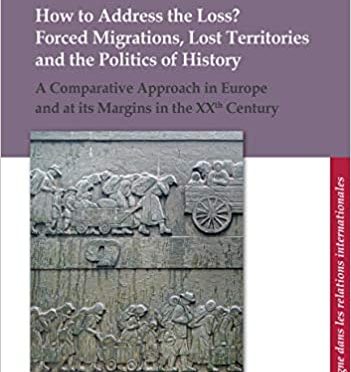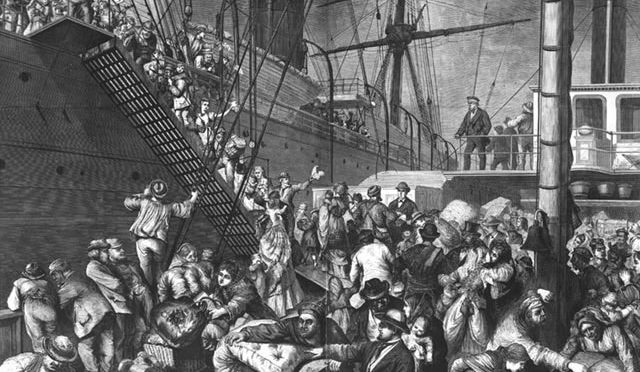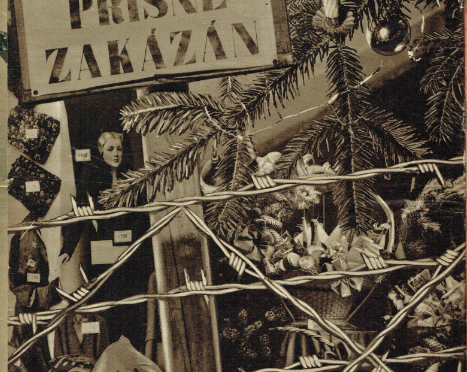
Představení knihy : How to address the Loss ? Forced Migrations, Lost Territories and the Politics of History. A Comparative Approach in Europe and at its Margins in the XXth Century, Bruxelles (et al.), Peter Lang, 2018.
ed. Anne Bazin & Catherine Perron
Tandem webinář
organizuje Michèle Baussant (CEFRES, CNRS) ve spolupráci s Marií Kokkinou (CEFRES / Karlova Univerzita) a Johanou Wyss (AV ČR / CEFRES). Webinář povede Florence Vychytil-Baudoux, přidružená členka Cefresu a doktorandka na EHESS Paris.
Prezentace
- Anne Bazin (Sciences po/Ceraps), Lille
- Catherine Perron (CERI, Sciences po), Paris
Diskuze
- Catherine Klein Gousseff (CERCEC, CNRS), Paris
- Katja Hrobat Virloget (University of Primorska), Koper
Sejdeme se na adrese:
https://us02web.zoom.us/j/83904186941
Meeting ID: 839 0418 6941

Jedenácté setkání semináře “Úvahy o krizi”, organizovaného CEFRESem a Fakultou sociálních věd UK, povede Maria Kokkinou, CEFRES / IMS FSV UK, a Florence Vychytil-Baudoux, EHESS / associate at CEFRES.
Téma: Migrační krize z pohledu historie a antropologie
Kde: online.
Pro registraci kontaktujte prosím organizátory: maria.kokkinou@cefres.cz.
Kdy: středa 16. prosince, 12:30-13:50
Jazyk: francouzština.
Přednáška je součástí semináře “Současné otázky. Úvahy o krizi”/”Enjeux contemporains. Penser les crises”, organizovaného Marií Kokkinou (CEFRES / UK) a Jérômem Heurtaux (CEFRES).
Prezentace semináře:
“Krize” nepřestává nabývat na významu: výskyt a nebývalé rozšíření koronaviru Covid-19 v roce 2020 dodalo tomuto pojmu aktuálnost, kterou nepamatujeme od doby finanční krize v roce 2009. Vedle těchto pozoruhodných událostí, jež svým významem zasáhly celou planetu, počet událostí a jevů kvalifikovaných jako krize neustále stoupá.
Tento pojem, nerozlučně se pojící s moderní dobou, zaměstnává celou naši společnost, a to všemi svými aspekty. Jeho mnohoznačné užití a značná aktuálnost nás vedou k úvahám nad jeho jednotlivými významy a užitími. Právě tomuto úkolu je věnován seminář “Úvahy o krizi”, do něhož se zapojí badatelé z nejrůznějších odvětví – politické sociologie, historie, historie umění, antropologie, filozofie a dalších.
Které skutečnosti jsou označovány jako “krize” a v čem jsou “kritické”? Co je to krize a jak vysvětlit její vznik? Jak se krize vyvíjí a jaké jsou její dopady a důsledky? Proč krize vyvolávají konflikty ohledně interpretace svého významu? Je pojem “krize” centrálním tvůrcem naší modernity a klíčem k porozumění témat, která se prolínají současnou společností?

Deváté setkání semináře “Úvahy o krizi”, organizovaného CEFRESem a Fakultou sociálních věd UK, povede Michèle Baussant (CNRS, CEFRES).
Téma: “Here is a place that has left its place”: vzpomínky poražených, stopy krizí a dekolonizačních válek.
Kde: online.
Pro registraci kontaktujte prosím organizátory: maria.kokkinou@cefres.cz.
Kdy: středa 2. prosince, 12:30-13:50.
Jazyk: francouzština.
Přednáška je součástí semináře:
“Současné otázky. Úvahy o krizi”/”Enjeux contemporains. Penser les crises”
organizovaného Marií Kokkinou (CEFRES / UK) a Jérômem Heurtaux (CEFRES).
Prezentace semináře:
“Krize” nepřestává nabývat na významu: výskyt a nebývalé rozšíření koronaviru Covid-19 v roce 2020 dodalo tomuto pojmu aktuálnost, kterou nepamatujeme od doby finanční krize v roce 2009. Vedle těchto pozoruhodných událostí, jež svým významem zasáhly celou planetu, počet událostí a jevů kvalifikovaných jako krize neustále stoupá.
Tento pojem, nerozlučně se pojící s moderní dobou, zaměstnává celou naši společnost, a to všemi svými aspekty. Jeho mnohoznačné užití a značná aktuálnost nás vedou k úvahám nad jeho jednotlivými významy a užitími. Právě tomuto úkolu je věnován seminář “Úvahy o krizi”, do něhož se zapojí badatelé z nejrůznějších odvětví – politické sociologie, historie, historie umění, antropologie, filozofie a dalších.
Které skutečnosti jsou označovány jako “krize” a v čem jsou “kritické”? Co je to krize a jak vysvětlit její vznik? Jak se krize vyvíjí a jaké jsou její dopady a důsledky? Proč krize vyvolávají konflikty ohledně interpretace svého významu? Je pojem “krize” centrálním tvůrcem naší modernity a klíčem k porozumění témat, která se prolínají současnou společností?

Sedmé setkání semináře “Úvahy o krizi” , organizovaného CEFRESem a Fakultou sociálních věd UK, povede Fedora Parkmann (Ústav dějin umění AV ČR/CEFRES).
Téma: Fotografie, které upozornily na hospodářskou krizi.
Kde: online.
Pro registraci kontaktujte prosím organizátory: maria.kokkinou@cefres.cz.
Kdy: středa 18. listopadu, 12:30-13:50.
Jazyk: francouzština.
Přednáška je součástí semináře:
“Současné otázky: Úvahy o krizi”/”Enjeux contemporains. Penser les crises”
organizovaného Marií Kokkinou (CEFRES / UK) a Jérômem Heurtaux (CEFRES).
Prezentace semináře:
“Krize” nepřestává nabývat na významu: výskyt a nebývalé rozšíření koronaviru Covid-19 v roce 2020 dodalo tomuto pojmu aktuálnost, kterou nepamatujeme od doby finanční krize v roce 2009. Vedle těchto pozoruhodných událostí, jež svým významem zasáhly celou planetu, počet událostí a jevů kvalifikovaných jako krize neustále stoupá.
Tento pojem, nerozlučně se pojící s moderní dobou, zaměstnává celou naši společnost, a to všemi svými aspekty. Jeho mnohoznačné užití a značná aktuálnost nás vedou k úvahám nad jeho jednotlivými významy a užitími. Právě tomuto úkolu je věnován seminář “Úvahy o krizi”, do něhož se zapojí badatelé z nejrůznějších odvětví – politické sociologie, historie, historie umění, antropologie, filozofie a dalších.
Které skutečnosti jsou označovány jako “krize” a v čem jsou “kritické”? Co je to krize a jak vysvětlit její vznik? Jak se krize vyvíjí a jaké jsou její dopady a důsledky? Proč krize vyvolávají konflikty ohledně interpretace svého významu? Je pojem “krize” centrálním tvůrcem naší modernity a klíčem k porozumění témat, která se prolínají současnou společností?

Šesté setkání semináře “Úvahy o krizi” , organizovaného CEFRESem a Fakultou sociálních věd UK, povedou Chiara Mengozzi (FF UK / CEFRES) a Julien Wacquez (CEFRES).
Téma: “Znázornění živoucího: zhroucení ekosystémů a rekonfigurace vědomostí”
Kde: online.
Pro registraci kontaktujte prosím organizátory: maria.kokkinou@cefres.cz.
Kdy: středa 11. listopadu, 12:30–13:50.
Jazyk: francouzština.
Přednáška je součástí semináře:
“Současné otázky: Úvahy o krizi”/”Enjeux contemporains : Penser les crises”, organizovaného Marií Kokkinou (CEFRES / UK) a Jérômem Heurtaux (CEFRES).
Prezentace semináře:
“Krize” nepřestává nabývat na významu: výskyt a nebývalé rozšíření koronaviru Covid-19 v roce 2020 dodalo tomuto pojmu aktuálnost, kterou nepamatujeme od doby finanční krize v roce 2009. Vedle těchto pozoruhodných událostí, jež svým významem zasáhly celou planetu, počet událostí a jevů kvalifikovaných jako krize neustále stoupá.
Tento pojem, nerozlučně se pojící s moderní dobou, zaměstnává celou naši společnost, a to všemi svými aspekty. Jeho mnohoznačné užití a značná aktuálnost nás vedou k úvahám nad jeho jednotlivými významy a užitími. Právě tomuto úkolu je věnován seminář “Úvahy o krizi”, do něhož se zapojí badatelé z nejrůznějších odvětví – politické sociologie, historie, historie umění, antropologie, filozofie a dalších.
Které skutečnosti jsou označovány jako “krize” a v čem jsou “kritické”? Co je to krize a jak vysvětlit její vznik? Jak se krize vyvíjí a jaké jsou její dopady a důsledky? Proč krize vyvolávají konflikty ohledně interpretace svého významu? Je pojem “krize” centrálním tvůrcem naší modernity a klíčem k porozumění témat, která se prolínají současnou společností?

Páté setkání semináře “Úvahy o krizi” , organizovaného CEFRESem a Fakultou sociálních věd UK, povede Jérôme Heurtaux (Paris-Dauphine Université, CEFRES).
Téma: “1958, 1968, 2002: politické krize ve Francii”
Kde: online.
Pro registraci kontaktujte prosím organizátory: maria.kokkinou@cefres.cz.
Kdy: středa 4. listopadu, 12:30-13:50.
Jazyk: francouzština.
Přednáška je součástí semináře “Současné otázky: Úvahy o krizi”/”Enjeux contemporains : Penser les crises”, organizovaného Marií Kokkinou (CEFRES / UK) a Jérômem Heurtaux (CEFRES).
“Krize” nepřestává nabývat na významu: výskyt a nebývalé rozšíření koronaviru Covid-19 v roce 2020 dodalo tomuto pojmu aktuálnost, kterou nepamatujeme od doby finanční krize v roce 2009. Vedle těchto pozoruhodných událostí, jež svým významem zasáhly celou planetu, počet událostí a jevů kvalifikovaných jako krize neustále stoupá.
Tento pojem, nerozlučně se pojící s moderní dobou, zaměstnává celou naši společnost, a to všemi svými aspekty. Jeho mnohoznačné užití a značná aktuálnost nás vedou k úvahám nad jeho jednotlivými významy a užitími. Právě tomuto úkolu je věnován seminář “Úvahy o krizi”, do něhož se zapojí badatelé z nejrůznějších odvětví – politické sociologie, historie, historie umění, antropologie, filozofie a dalších.
Které skutečnosti jsou označovány jako “krize” a v čem jsou “kritické”? Co je to krize a jak vysvětlit její vznik? Jak se krize vyvíjí a jaké jsou její dopady a důsledky? Proč krize vyvolávají konflikty ohledně interpretace svého významu? Je “krize” centrálním tvůrcem naší modernity a klíčem k porozumění témat, která se prolínají současnou společností?





